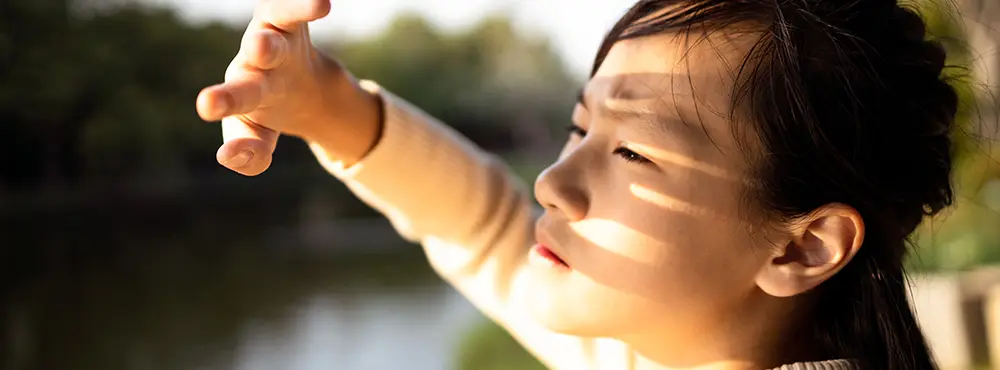Photophobia refers to light sensitivity. This may cause squinting, teary eyes and discomfort in the eyes or head in response to sunlight or bright artificial lighting. This neurological condition is fairly common and isn’t considered medically serious. However, it can be a cause for concern if it interferes with day-to-day life.
Fortunately for those who experience photophobia, the use of light sensitivity glasses may help manage the symptoms of photophobia. Read more to find out!
What is the cause of photophobia?
There is no single cause of photophobia; in fact, there are many reasons why someone may experience photophobia.
One of the most common triggers is migraines. Those who suffer from migraines often report experiencing photophobia in bright fluorescent lights, blue lights from computer screens and a change in light levels. This can be experienced before, during or after a migraine attack.
Photophobia can also be triggered by eye conditions such as dry eyes, cataracts, and glaucoma. This may be due to inflammation or ‘light scatter’ in the eye which increases sensitivity to light.
Other reasons people may experience photophobia include:
- Wearing contact lenses for too long or wearing ill-fitted lenses
- Recovering from eye surgery
- Taking certain medication
- Medical conditions such as meningitis
How do you know if you have photophobia?
It is important to be able to recognise the symptoms of photophobia so that you can seek the correct treatment as soon as possible. The most obvious symptom is the sun or bright indoor lights causing discomfort. Other symptoms can be:
- Excessive squinting and/or blinking
- Watery eyes
- Excessive headaches
- Experiencing dizziness
These symptoms can be a sign of photophobia, however, they are also common symptoms of other health conditions, so it is important to get checked by a medical professional as soon as possible if you are experiencing these symptoms.
How do you reduce photophobia?
The most effective way to manage photophobia is with light sensitivity glasses. These glasses are specifically designed to reduce discomfort caused by bright lights; they do so by reducing the amount of light that enters the eye.
There are different types of glasses for light sensitivity, so you can choose the right ones to suit your needs. Here are some options:
Photochromic/Transition lenses
As the name suggests, these lenses transition from clear to dark when they come into contact with UV rays. In fact, the higher the intensity of UV rays and brightness, the darker the lenses become – making them ideal for those who have a high intolerance to bright sunlight. Additionally, these lenses block 100% of UVA and UVB rays.
There are many emerging brands of photochromic lenses, but the most popular and arguably the most advanced is Transitions.
To decide whether these lenses are the right light-sensitivity option for you, you’ll want to read our full guide on photochromic/transition lenses.
Polarised tints
Polarised lenses have a light-filtering chemical added to them – this means light cannot freely pass through the lenses, and any glare is significantly reduced.
Opting for polarised tints on your glasses can alleviate eye strain caused by brightness, whilst clarifying your vision in sunlight. This is a good option for those who avoid daytime sun due to light sensitivity.
Migraine glasses
Migraines are a leading cause of photophobia. However, contrary to what you may see online, there is no such thing as special migraine glasses.
Fortunately, there are ways to ensure your glasses reduce light sensitivity which is beneficial for frequent migraine sufferers.
Our optician recommends opting for a comfort tint when selecting the right glasses for you; for example, a rose-coloured tint may improve symptoms as this prevents this specific frequency of light from reaching the eye.
If you want to know more about what tint options are available at Feel Good Contacts, read our full guide on tinted glasses.
Does photophobia ever go away?
Some people may experience constant sensitivity to light, whilst others may find it comes and goes. As photophobia is most commonly a symptom of an underlying issue, i.e., migraine or dry eyes; it is important to find the root cause and seek treatment for this.
For example, if you are experiencing photophobia during a migraine attack, over-the-counter medication such as paracetamol may ease discomfort from bright lights as well as reduce headaches. Similarly, if your eyes have become light-sensitive as a result of dry eyes, you should seek treatment for dry eyes as this will then reduce photophobia.
Additionally, incorporating the following into your daily routine may help reduce photophobia:
- Reducing screen time and adjusting brightness to a comfortable level
- Avoiding the use of fluorescent lighting at home
- Using cold compresses on your forehead
- Removing sunglasses when indoors as this can make photophobia worse over time
If you suffer from photophobia, it’s important to seek advice from your optician who will be able to advise you according to your specific experience.
Quick links:
A guide to conjunctivitis
What are polarised sunglasses?
Protecting eyes from UV rays
Do I need an eye test?
Disclaimer: The advice in this article is for informational purposes only and does not replace medical care or an in-person check-up. Please check with an eyecare professional before purchasing any products or remedies. For information on our article review process, please refer to our Editorial Policy.

 Offers
Offers Account
Account
 Favorite
Favorite
 Basket
Basket

 OFFERS
OFFERS
















